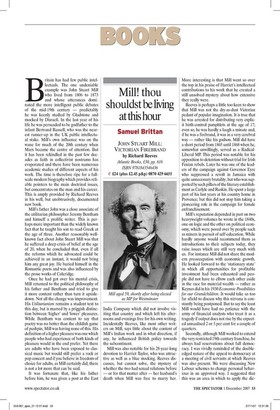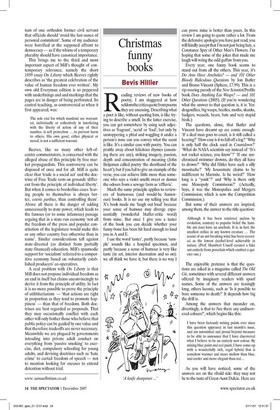Mill! thou shouldst be living at this hour
Samuel Britten JOHN STUART MILL: VICTORIAN FIREBRAND by Richard Reeves Atlantic Books, £30, pp. 616 ISBN 9781843546436 © £24 (plus £2.45 p&p) 0870 429 6655 Britain has had few public intellectuals. The one undeniable example was John Stuart Mill who lived from 1806 to 1873 and whose utterances dominated the more intelligent public debates of the mid-19th century — predictably he was keenly studied by Gladstone and mocked by Disraeli. In the last year of his life he was persuaded to be godfather to the infant Bertrand Russell, who was the nearest runner-up in the UK public intellectual stake. Mill's own influence was on the wane for much of the 20th century when Marx became the centre of attention. But it has been rekindled in the past few decades as faith in collectivist nostrums has evaporated and there have been numerous academic studies of different aspects of his work. The time is therefore ripe for a fullscale modern biography which provides reliable pointers to the main doctrinal issues, but concentrates on the man and his career. This is amply provided by Richard Reeves in his well, but unobtrusively, documented new book.
Mill's father John was a close associate of the utilitarian philosopher Jeremy Bentham and himself a prolific writer. This is perhaps more important than the widely known fact that he taught his son to read Greek at the age of three. Another reasonably wellknown fact about John Stuart Mill was that he suffered a deep crisis of belief at the age of 20, when he concluded that, even if all the reforms which he advocated could be achieved in an instant, it would not bring him any great joy. He buried himself in the Romantic poets and was also influenced by the prose works of Coleridge.
Once he had got over his mental crisis, Mill returned to the political philosophy of his father and Bentham and tried to give it more content rather than turn it upsidedown. Not all the change was improvement. His Utilitarianism remains a student text to this day, but is marred by a priggish distinction between 'higher' and 'lower' pleasures. While Bentham was content to say that poetry was no better than the childish game of pushpin, Mill was having none of this. His definition of a higher pleasure was one which people who had experience of both kinds of pleasure would in the end prefer. Yet there are adults who have been exposed to classical music but would still prefer a rock or pop concert and if you believe in freedom of choice for adults, as Mill certainly did, there is not a lot more that can be said.
It was fortunate that, like his father before him, he was given a post at the East India Company which did not involve visiting that country and which left his afternoons and evenings free for his own writing. Incidentally Reeves, like most other writers on Mill, says little about the content of Mill's Indian work and in what direction, if any, he influenced British policy towards the subcontinent.
Mill was also notable for his 28-year-long devotion to Harriet Taylor, who was attractive as well as a blue stocking. Reeves discusses, but cannot solve, the mystery of whether the two had sexual relations before — or for that matter after — her husband's death when Mill was free to marry her.
More interesting is that Mill went so over the top in his praise of Harriet's intellectual contributions to his work that he created a still unsolved mystery about how extensive they really were.
Reeves is perhaps a little too keen to show that Mill was not the dry-as-dust Victorian pedant of popular imagination. It is true that he was arrested for distributing very explicit birth-control pamphlets at the age of 17; even so, he was hardly a laugh a minute and, if he was a firebrand, it was in a very cerebral way — rather like his godson. Mill did have a short period from 1865 until 1868 when he, somewhat unwillingly, served as a RadicalLiberal ME This period was notable for his opposition to detention without trial for Irish Fenian rebels. Later he was one of the leaders of the campaign against Governor Eyre who suppressed a revolt in Jamaica with quite unnecessary brutality, but who was supported by such pillars of the literary establishment as Carlyle and Ruskin. He spent a large part of his last years at his country home in Provence; but this did not stop him taking a pioneering role in the campaign for female enfranchisement.
Mill's reputation depended in part on two heavyweight volumes he wrote in the 1840s, one on logic and the other on political economy, which were pored over by people such as miners in pursuit of self-education. While hardly anyone would recommend them as introductions to their subjects today, they raise issues which are still very much with us. For instance Mill did not share the modern preoccupation with economic growth. He looked forward to the 'stationary state' in which all opportunities for profitable investment had been exhausted and people did not have to elbow each other aside in the race for material wealth — rather as Keynes did in his 1930 Economic Possibilities for our Grandchildren. It would take us too far afield to discuss why this nirvana is constantly being postponed. But to say the least Mill would have had no patience with the army of financial analysts who treat it as a tragedy if output does not rise by the expected annualised 2 or 3 per cent for a couple of quarters.
Secondly, although Mill worked to extend the very restricted 19th-century franchise, he always had reservations about full democracy. I was vividly reminded of the doubleedged nature of the appeal to democracy at a meeting of civil servants at which Reeves was also present. We were discussing New Labour schemes to change personal behaviour in an approved way. I suggested that this was an area in which to apply the dicturn of one orthodox former civil servant that officials should 'avoid the last ounce of personal commitent'. Some of my audience were horrified at the supposed affront to democracy — as if the whims of a temporary plurality should have canonical importance.
This brings me to the third and most important aspect of Mill's thought of contemporary relevance, namely the short 1859 essay On Liberty which Reeves rightly describes as `the greatest celebration of the value of human freedom ever written'. My own old Everyman edition is so peppered with underlinings and and markings that the pages are in danger of being perforated. Its central teaching, as controversial as when it first appeared, was: The sole end for which mankind are warranted, individually or collectively in interfering with the liberty of action of any of their number, is self protection ... to prevent harm to others. His own good, either physical or moral, is not a sufficient warrant.
Reeves, like so many other left-ofcentre commentators, is concerned with the alleged abuse of this principle by free market propagandists. This controversy can be disposed of once and for all. Mill is quite clear that 'trade is a social act' and the doctrine of Free Trade rests on grounds 'different from the principle of individual liberty'. But when it comes to borderline cases 'leaving people to themselves is always better, ceteris paribus, than controlling them'. Above all there is the danger of adding unnecessarily to state power, which leads to the famous (or to some infamous) passage arguing that in a state-run economy 'not all the freedom of the press and popular constitution of the legislature would make this or any other country free otherwise than in name'. Similar considerations tell against state-directed (as distinct from partially state-financed) education. Mill's spasmodic support for 'socialism' referred to a competitive economy based on voluntarily established producers' co-operatives.
A real problem with On Liberty is that Mill does not propose individual freedom as an end in itself but claims unconvincingly to derive it from the principle of utility. In fact it is no more possible to prove the principle of utilititarianism — 'that actions are right in proportion as they tend to promote happiness' — than that of freedom. Both doctrines are best regarded as proposals. That they may occasionally conflict with each other will only bother those who believe that public policy can be guided by one value and that therefore tradeoffs are never necessary. Meanwhile we are plagued by governments intruding into private adult conduct on everything from 'passive smoking' to exercise, diet, compulsory schooling for young adults, and devising doctrines such as 'hate crime' to curtail freedom of speech — not to mention looking for excuses to extend detention without trial.






































































 Previous page
Previous page